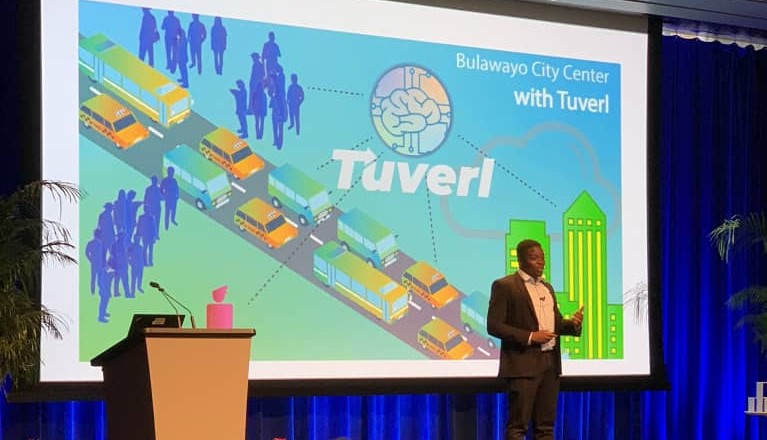A few months ago we wrote about the World Bank Youth Summit’s Competition 2019 which was focusing on smart city solutions. As fate would have it Tuverl a transport startup from Bulawayo was amongst the 5 finalists to compete and ended up winning the competition!

CEO of Tuverl Hope Tariro Ndhlovu 

Tuverl was part of 886 applicants from 96 countries across the globe and from there only 5 startups were chosen to pitch their businesses in Washington DC between 2 and 3 December.
The CEO of Tuverl Hope Tariro Ndhlovu who was in attendance shared a brief of Tuverl’s pitch with us which we felt does a great job of explaining the problem the company is trying to tackle:
In most African countries, Public Transport is an industry that is run by private companies; millions of small to medium enterprises, whose buses and minibuses operate without any schedules or timetables. This makes Public Transport very unreliable to commuters, who are often late to work or school as a result. Drivers also waste time, fuel, and man hours trying to locate commuters along their designated routes or park in one place waiting for commuters to find them. This is highly inefficient.
Commuters struggle with locating Buses and Minibuses as they are often piled up at “Taxi” Ranks or docked at inconvenient locations. On boarding Public Transport, commuters often experience delays as drivers park in at one bus stop or drive around in search for passengers to fill up the vehicle.
Tuverl is an app that seeks to make Public Transport, cheaper, reliable and more accessible to millions of commuters across African countries, by helping Operators reduce operational inefficiencies, optimize their routes and increase their revenue.
Tuverl leverages Geolocation, Fintech, and Machine Learning to improve and optimize Public Transport and how commuters in African countries pay for it, starting with Zimbabwe.
We have 2 mobile apps. A Commuter App and an Operator App. Using the Commuter App, Commuters can live track minibuses, book long distance buses, hail a Taxi and pay for their fares using fintech.
The Operator App empowers Drivers and Operators with tools to broadcast the live locations of their vehicles, manage their fleets, and process fares digitally.
The Public Transport Industry in Africa has a Total Addressable Market of US $65B. We can capture a Serviceable Obtainable Market (SOM) of roughly US$10B. The SOM includes our primary Target Market.
The above target market includes Commuters between the age of 18-24 years, and Operators and Drivers between the ages of 20-34 years. These commuters and operators live in Urban Cities, they own smartphones, are smartphone literate, have a Mobile Banking and generally use social media regularly. Public Transport Operators are owners of small to medium enterprises with a small fleet of vehicles ranging from 1-10.
These vehicles could include Minibuses with a capacity of 16 passengers or Buses with a capacity of 65 passengers.
We are a Bulawayo based startup. We are conducting a pilot. We hope the pilot program will help us fine tune our product and prepare us for a launch. We are hoping to launch our product early next year (2020)
Hope Tariro Ndhlovu – CEO & Co-Founder of Tuverl
When Tuverl launches in 2020 it appears the company won’t be competing with the likes of Vaya in the ride-hailing market using a different and seemingly more affordable model since people get to track minibuses which means the cost on the customer is spread amongst the 16-65 people who get to board the minibus/bus.



What’s your take?